SARS-CoV-2 Detected In Human Breastmilk, Reports New Study
There has been very little clarity whether the coronavirus that causes COVID-19 could be shed into breastmilk and transmitted to babies via breastfeeding.
Viral shedding refers to the expulsion and release of virus progeny which takes place when a virus replicates inside a person's body and gets released into the environment. At this point, it could be really contagious. In this case, the coronavirus which is found in the infected mother gets mixed into her breastmilk.
Several recent studies found no evidence of SARS-CoV-2 in human breastmilk. This could be attributed to the fact that the sample sizes were small.
“The COVID-19 virus has not, to date, been detected in the breastmilk of any mother with confirmed/suspected COVID-19. It appears unlikely, therefore, that COVID-19 would be transmitted through breastfeeding or by giving breastmilk that has been expressed by a mother who is confirmed/suspected to have COVID-19”, said the World Health Organization in April.
But SARS-CoV-2-RNA was detected in milk samples from a mother who tested COVID-19 positive and her baby exhibited mild COVID-19 symptoms, finds a new study.
The researchers at the Ulm University Medical Centre, Ulm, Germany sought to examine the breastmilk of two nursing mothers infected with COVID-19 to find out if the virus can be shed into breastmilk.
The Study:
The researchers collected breastmilk via pumps after feeding and nipple disinfection and stored it in sterile containers at 4°C or −20°C until further analysis. The viral loads were determined using RT-qPCR for SARS-CoV-2N and ORF1b-nsp14 genes.
Key findings of the study:
- SARS-CoV-2 RNA was detected in breastmilk extracted from one of the study participants for 4 consecutive days
- Viral RNA detection from the mother coincided with the mild coronavirus symptoms exhibited by the infant
- The mother whose infant tested COVID-19 positive had been wearing a surgical mask ever since the onset of her symptoms
- She had also been taking precautionary safety measures when handling or feeding the baby including breast disinfection, proper hand disinfection, strict washing as well as sterilization of milk pumps and tubes
- Breastmilk samples were taken subsequently tested negative for the coronavirus
- The actual viral loads in the whole milk were higher than that of the skimmed milk
“However, whether Newborn 2 was infected by breastfeeding or other modes of transmission remains unclear. Further studies of milk samples from lactating women and possible virus transmission via breastfeeding are needed to develop recommendations on whether mothers with COVID-19 should breastfeed,” concluded the researchers in their paper published in the Lancet.

© Copyright IBTimes 2024. All rights reserved.





















